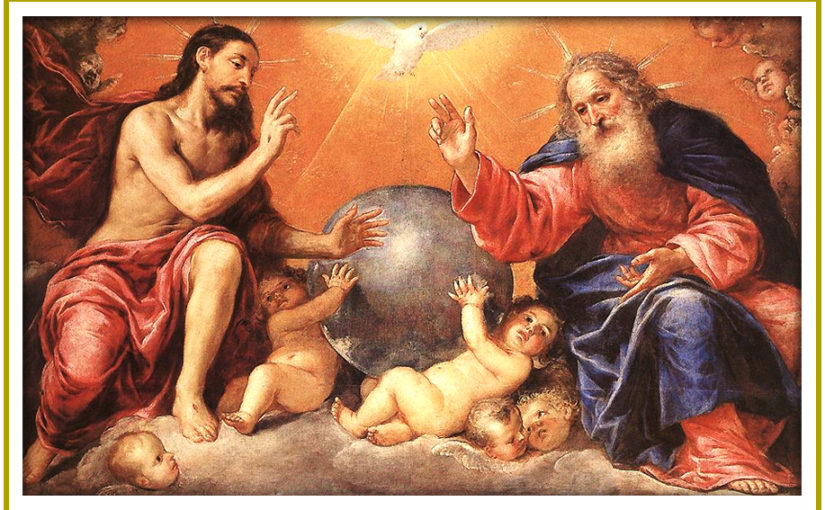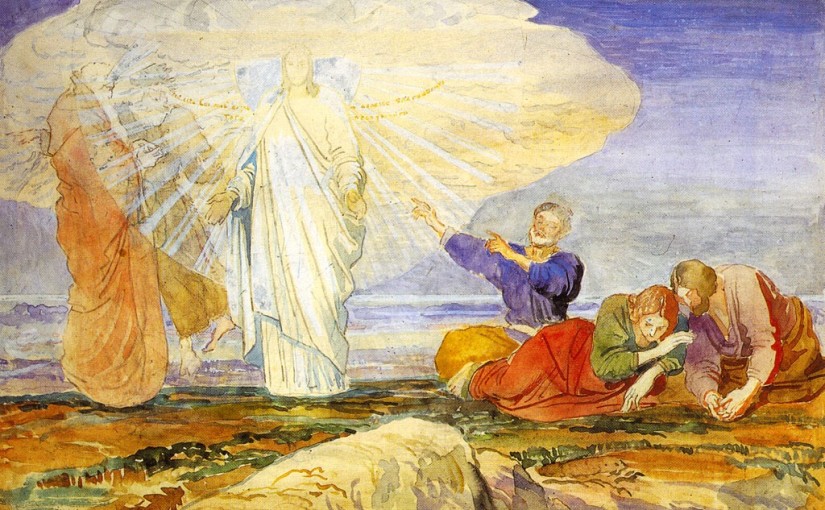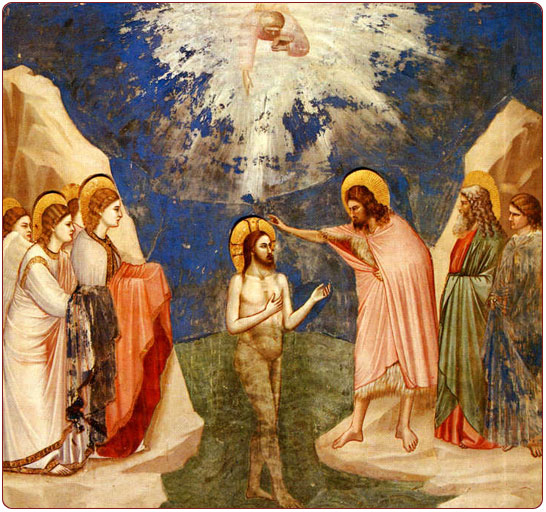Today’s feast has us gathered to celebrate one of the greatest mysteries of our faith, the Most Holy Trinity. Today we celebrate our one God in three Persons: Father, Son and Holy Spirit. One of my favorite stories is about Saint Augustine, grappling with the sublime concept of the Trinity. The story goes that he was walking along the beach one day, trying to figure out the nature of the Holy Trinity. As he walked along, he came across a little boy who had dug a hole in the sand right next to the shore. With his little hands he was carrying water from the ocean and was dumping it in the little hole. St. Augustine asked, “What are you doing, my child?” The child replied, “I want to put all of the water of the ocean into this hole.” Augustine asked him, “But is it possible for all of the water of this great ocean to be contained in that little hole you’ve dug?” And the child asked him in return, “If the water of the ocean cannot be contained in this little hole, then how can the Infinite Trinitarian God be contained in your little mind?” With that the child disappeared.
Indeed, the greatest minds of our faith have wrestled with this notion of the Holy Trinity. How can one God contain three Persons, how could they all be present in the world, working among us in different ways, and yet remain but one? Even the great Saint Patrick, who attempted to symbolize the Trinity with a shamrock, could only scratch the surface of this great mystery.
I think the Trinity isn’t the kind of mystery one solves. And that’s hard for me because I love a good mystery! When I have the chance to just read what I want to read, it’s almost always a mystery novel. I read Agatha Christie all the time growing up, and I’ll often go back to some of her stuff even now. My love for mysteries probably explains why I like to watch “Blue Bloods” and “NCIS.” It’s great to try to figure out the mystery before the end of the book or the end of the show. But, if you like mysteries too, then you know that the mark of a good mystery is when it doesn’t get solved in the first six pages. It’s good to have to think and rethink your theory, right up until the last page.
The kind of mystery that is the Holy Trinity is a mystery that takes us beyond the last page. This is one we’ll take to heaven with us, intending to ask God to explain it when we get there, but when we get there, we’ll most likely be too much in awe to ask any questions. And so we are left with the question, who is this that is the Holy Trinity? How do we explain our one God in Three Persons? Who is this one who is beyond everything and everyone, higher than the heavens, and yet nearer than our very own hearts?
One of the best minds of our faith, Saint Thomas Aquinas, has described the Holy Trinity as a relationship. The Father loves the Son and the Son loves the Father, and the Holy Spirit is the love between the Father and the Son. And this makes sense to us on some levels, because we all have been taught, and we all accept, that God is love. And not just the kind of paltry love that our pop culture and society calls love, but love in the deepest of all senses, the kind of love that is self-giving and that intimately shares in the life of the other. God is love, but God is better than the best love our feeble human minds can picture. The love that is God is a love so pure that it would wholly consume us if we gave ourselves to it completely. Just as difficult as it is for our minds to describe the Holy Trinity, so that love that is God is impossible for our minds to grasp.
But this picture of God as a relationship of love is important to us, I think, because we need to relate to God in different ways at different times. Because sometimes we need a parent. And so relating to God as Father reminds us of the nurturing of our faith, being protected from evil, being encouraged to grow, and being corrected when we stray. If you’ve had difficulty with a parent in your life, particularly a father, then relating to God as Father can also be difficult. But still, I think there is a part of all of us, no matter what our earthly parents have been like, that longs to have a loving parental relationship. God as Father can be that kind of parent in our lives.
And sometimes we need the Son. Relating to God the Son – Jesus our brother – reminds us that God knows our needs, he knows our temptations, he’s experienced our sorrows and celebrated our joys. God in Christ has walked our walk and died our death and redeemed all of our failures out of love for us. God the Son reminds us that God, having created us in his own image and likeness, loves what he created enough to become one of us. Our bodies are not profane place-holders for our souls, our bodies are temples of the Holy Spirit, and that very body was good enough to become the dwelling place of God when he came to earth. Maybe you’ve never had a brother or sister or never were close to yours, but in Christ you have the brother above all others who is present to you in all your joys and sorrows.
Sometimes, too, we need a Holy Spirit. Because we often have to be reminded that there is something beyond ourselves. That this is not as good as it gets. As wonderful as our world and our bodies can be, we also know they are very flawed. The Holy Spirit reminds us that there is a part of us that always longs for God, no matter how far we have strayed. The Spirit reminds us that our sins are not who we are and that repentance and forgiveness are possible. It is the Holy Spirit that enables us to do the really good things we wouldn’t be capable of all by ourselves, the really good things that are who we really are before God.
It might seem like this mystery of the Trinity is a purely academic discussion. Does the Trinity affect our daily lives or make a difference in our here and now? Is all this discussion just talk, or does it really make any difference? Obviously, I don’t think it’s just talk. Instead, as our Gospel suggests today, the Most Holy Trinity must be shared with people in every time and place. God the Father, Son and Holy Spirit wants to relate to all of us, be present to all of us, and call all of us to discipleship through common baptism, and it’s up to us to point the way to that Trinity of love that longs to be in loving relationship with all people.
Sometimes the hymnody of our faith can express what prose alone can’t get at. The great old hymn, “Holy, Holy, Holy” by Reginald Heber sums up our awe of the Trinity today. Join me in praising God the Father, Son and Holy Spirit by singing this verse, if you know it:
Holy, holy, holy! Lord God Almighty!
All thy works shall praise thy name, in earth and sky and sea.
Holy, holy, holy! Merciful and mighty,
God in three persons, blessed Trinity.




You must be logged in to post a comment.